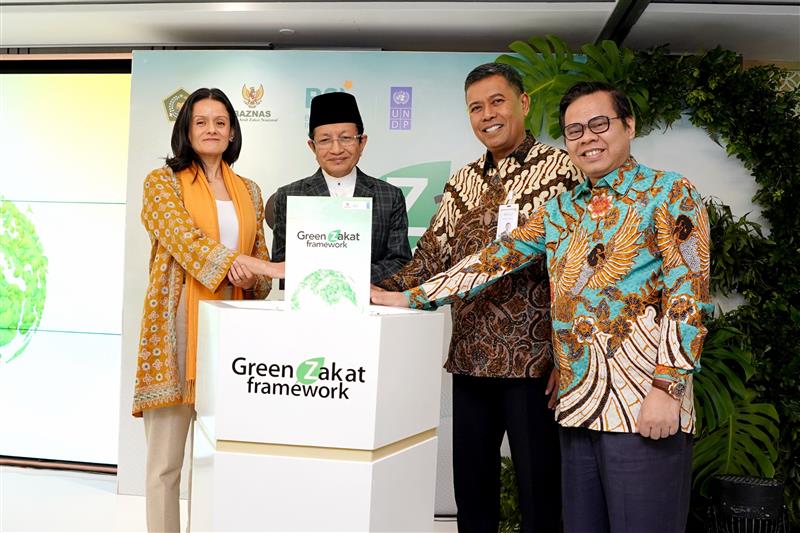PT Bank Syariah Indonesia Tbk (BSI) has launched the Green Zakat Framework, marking a global first in integrating sustainability principles into zakat management.
The initiative supports the government’s Asta Cita program, which promotes national resilience and independence through a green economy approach.
The launch was held in Jakarta with the participation of the Minister of Religious Affairs Nasaruddin Umar, UNDP Indonesia’s Deputy Resident Representative Sujala Pant, and BAZNAS’s Head of Fundraising Rizaludin Kurniawan.
BSI’s President Director Anggoro Eko Cahyo (effective after passing the OJK’s fit and proper test) reaffirmed the bank’s commitment to this initiative.
BSI Champions Environmental Integration in Islamic Finance
The Green Zakat Framework is a strategic innovation aimed at embedding sustainability values into zakat practices.
It positions zakat not only as a tool for poverty alleviation but also as a means to support environmental preservation and sustainable development.
“BSI, in running its business and operations, always prioritizes programs that benefit the ummah and support sustainability. The Green Zakat Framework is a solution expected to foster broader collaboration among institutions and increase public interest in zakat so that Indonesia’s zakat potential of Rp327 trillion can be optimized and bring wider benefit to the community,” said Anggoro.
Rp327 Trillion Zakat Potential Aligned with Green Economy Goals
BSI noted that Indonesia’s zakat potential reaches Rp327 trillion, and the Green Zakat Framework is seen as a way to better utilize this figure for environmental and social benefit.
As of May 2025, BSI had distributed Rp65.6 billion in zakat year-to-date across sectors including the economy, education, health, humanitarian aid, and advocacy.
The total number of beneficiaries reached 240,075 people. Programs such as Desa BSI, BSI Scholarship, and BSI MSME Centers have assisted more than 15,700 individuals.
BSI has also distributed nearly Rp1 trillion in zakat from corporate and employee contributions, supporting empowerment programs, including the creation of supported villages, and initiatives like the use of Reverse Vending Machines (RVM) for plastic recycling.
Rp72.8 Trillion in Sustainable Financing Disbursed by Mid-2025
As of June 2025 (unaudited), BSI had disbursed Rp72.8 trillion in sustainable financing, a 19.3% increase year-on-year. This includes:
- Rp15.3 trillion in green financing, up 14.5% YoY
- Rp57.5 trillion in social financing, up 20.6% YoY
Green financing was mainly directed toward biodiversity and sustainable land use, eco-efficiency, and renewable energy. BSI also finances electric vehicles and other environmentally friendly initiatives.
Additional sustainability programs include green building launches, the "One Home One Tree" initiative for every home financing disbursed, the development of charging stations, and the use of electric vehicles for operations.
BSI implements the ISO 26000 standard to support its Sustainable Beyond Banking pillar and takes the lead in the ZISWAF ecosystem to align with sustainable development goals.
Institutional Collaboration to Advance Ethical and Environmental Zakat
The launch event featured a panel discussion titled “Institutionalizing Green Zakat and Green Waqf: Turning Ethical Finance into Environmental Action.”
The session focused on the importance of transparency, impact measurement, and long-term sustainability in managing environment-based zakat.
Discussions emphasized collaboration among the government, religious institutions, Islamic banking, and civil society.
BSI continues to develop environmental empowerment programs through zakat funds, including the installation of solar panels, greenhouse construction, waste management, marine ecosystem preservation, and integrated waste processing, especially through the Desa BSI and BSI MSME Center programs.
PHOTO: BSI
This article was created with AI assistance.
Read More






 Monday, 26-01-26
Monday, 26-01-26







